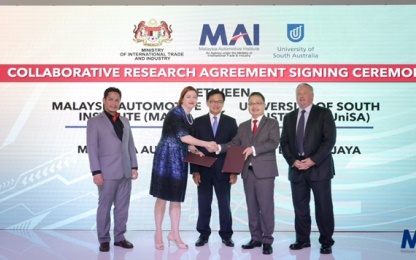29 August 2017
 The University of South Australia has signed a five-year, $5 million collaboration agreement with the Malaysian Automotive Institute (MAI) to establish an Automotive Innovation Centre (AIC) dedicated to developing both technological and sociological innovations in the automotive sector that promote sustainability.
The University of South Australia has signed a five-year, $5 million collaboration agreement with the Malaysian Automotive Institute (MAI) to establish an Automotive Innovation Centre (AIC) dedicated to developing both technological and sociological innovations in the automotive sector that promote sustainability.
Announcing the partnership, UniSA Deputy Vice Chancellor: Research, Professor Tanya Monro says the new institute will be headquartered at UniSA’s Future Industries Institute (FII) and will support research into mobility with a broad focus - encompassing new technologies and social sciences.
“This important collaboration builds on our strong links with MAI through the work UniSA has been contributing as part of the Automotive Australia 2020 Cooperative Research Centre and our innovations in thin film plastic coatings for the automotive industry,” Prof Monro says.
“These breakthrough manufacturing technologies have huge potential for the global automotive industry but recognising that in applying research to problems in the real world, we uncover complexities that go beyond a single field of expertise.
“The partnership with MAI will see us tackle cross-disciplinary research problems that have the capacity to deliver disruptive innovation to advance the development of the next generation of electric and autonomous vehicles.
“Our research projects will straddle the physical and social sciences, with a particular emphasis on a clean, green automotive future around electric and autonomous vehicles.
“We are excited to be moving to deepen our collaboration and consolidate some of the plans we made when we signed an MOU to collaborate with MAI in 2016. Whilse our own automotive industry is on the verge of permanent closure, in other countries it is growing from strength to strength.”
One of the first projects researchers will be working on within the AIC is the development of lightweight, heat reflecting, coatings for windows on electric vehicles and buses.
Chief Executive Officer of the MAI, Madani Sahari says the partnership with UniSA will work on $1 million worth of projects each year for the next five years.
“This will be an invaluable partnership between UniSA and MAI and we look forward, not only to direct implementation and commercialisation of current technologies, but also this platform will be used to conduct further research into new technologies,” Sahari says.
“I believe we will break new ground ensuring that MAI is always at the forefront of the technologies needed to remain competitive.”
David Klingberg Chair in Advanced Manufacturing at UniSA’s FII, Prof Peter Murphy, says the project goal is to deliver a heat reflecting plastic window that is 50 per cent lighter than glass, but still retains the durability and performance characteristics of glass.
“The heat-reflecting coatings we are developing allow lighter-weight window options than traditional glass at the same time as reducing heat load into the interior of the vehicle,” Prof Murphy says.
“The knock-on effects of this one innovation will be to improve the efficiency of the air-conditioning system (it will not need to run as much) and in the case of an electric vehicle, this will correspondingly enhance battery life and hence the range of the vehicle.
“This partnership with MAI is an exciting development for us and will see us engage research expertise across UniSA to deliver innovative solutions that will drive the development of the vehicles of tomorrow.
“Our work will be informed by the Malaysian automotive sector to understand their future technological needs and aspirations.”
Media contact: Michèle Nardelli mobile 0418 823 673 email michele.nardelli@unisa.edu.au


